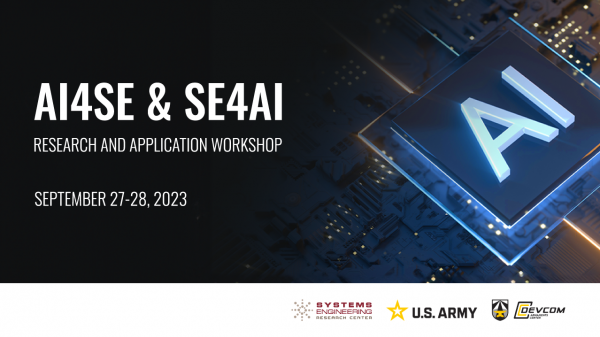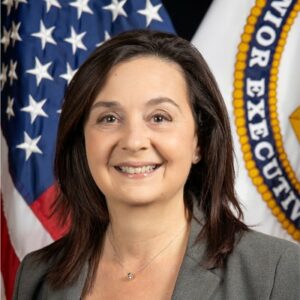Sponsored & organized by U.S. Army DEVCOM Armaments Center (AC) Systems Engineering Directorate and the Systems Engineering Research Center (SERC) in collaboration with the George Washington University
Balancing Opportunity and Risk: The Systems Engineer’s Role in the Rapid Advancement of AI-Based Systems
The 2023 AI4SE/SE4AI Workshop was held in-person on September 27-28 at the George Washington University in Washington, DC. Abstracts were sought from government, industry and academia for presentations and panels to explore the exciting advancements and challenges in the field of artificial intelligence (AI) and systems engineering (SE). All selected abstracts and presentations must be approved for public release.
The rapid development of AI presents both tremendous opportunities and inherent risks. As AI continues to revolutionize various industries, it becomes crucial to strike a delicate balance between seizing the potential benefits and addressing the potential risks. The conference theme, “Balancing Opportunity and Risk: The Systems Engineer’s Role in the Rapid Advancement of AI-Based Systems,” aims to foster discussions and insights on the responsible deployment of AI in systems engineering and how systems engineering can support the development of robust and ethical AI systems.
The conference theme, “Balancing Opportunity and Risk: The Systems Engineer’s Role in the Rapid Advancement of AI-Based Systems,” explores the intricate relationship between artificial intelligence (AI) and systems engineering, encompasses five distinct tracks. The SE4AI track focuses on leveraging systems engineering principles and methodologies to develop robust and efficient AI systems. The AI4SE track delves into the application of AI in systems engineering processes, enabling enhanced decision-making, optimization, validation, and verification. The Human-AI Teaming track examines the collaboration between humans and AI, exploring how to maximize the synergistic potential while addressing ethical and social implications. The Trustworthy AI track highlights the critical aspects of safety, reliability, and ethical considerations in developing and deploying AI systems. Lastly, the Digital Engineering & SE Workforce Development track explores the evolving role of digital engineering and its impact on the systems engineering workforce, fostering skill development and adaptation in an AI-driven landscape. This comprehensive framework ensures a holistic exploration of the opportunities and risks associated with AI in systems engineering, paving the way for responsible and sustainable development.
Topics of Interest
- Application of AI on SE projects
- Application of SE on AI projects
- V&V and T&E of Learning Based Systems
- Systems Approaches to Reliability and Safety of Learning Based Systems
- Workforce Development for AI4SE & SE4AI
- AI/ML Technology Evolution
- Augmented Intelligence, Cognitive Assistants and Decision Aiding Tools
- Automation & Human-Machine Teaming in Systems and Missions
- Digital Engineering Infrastructure and Methods in Support of AI
- Advances in Explainability, Interpretability, and Transparency
- Advances to Address Cognitive Bias in AI
- Testbeds for Learning-Based Systems
- SE and Data Collection/Curation for AI in Systems
- Standards of Trust and Evaluation of Trust in SE (Technical, Organizational, Societal)
- Impact of Large Language Models/Foundation Models on SE





